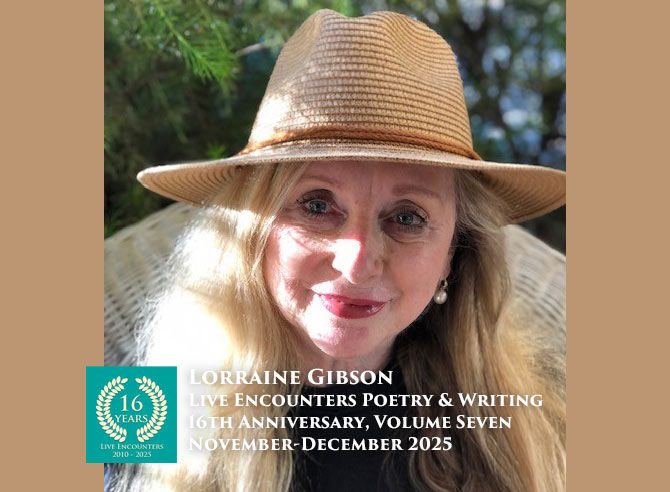
Live Encounters Poetry & Writing 16th Anniversary Volume Seven
November- December 2025
Aberfan, poem by Lorraine Gibson.
Aberfan
Rain falls gently greening the valley,
three weeks of rain, constant,
heavy, soaking through slag
above tip number 7.
Beautiful children sit in assembly,
half-term holidays three hours away.
Ash and old tailings form
a liquified blackness
a glistening wave that roared
down the mountain, poured
through school windows,
filled up the classrooms
and smothered the children waiting to sing
of All things bright and beautiful
deep in the valley of dear Aberfan.
Here are the miners, the mothers, the fathers,
digging for children, digging through slurry,
hunting through pockets for sweeties
for hankies, for something;
something to tell them
thank God you’re not mine.
A whistle sounds. The crowd calls for quiet.
But all that is heard is human exertion,
the anguish of parents waiting
above ground. The parents that knew
of the underground springs
that soaked through the tip to join with the rain.
The Council who knew
that ‘something’ was wrong
and hoped to do ‘something’. But ‘something’
costs money said the National Coal Board
and should workers keep talking
their jobs are in peril from bosses
who value the power of the pound.
Embalmers from Ireland fly
a cargo of coffins to tend the small bodies
of Aberfan’s future.
Then came the spin from the bosses and lackies.
‘If only we’d known’ of the underground springs
or known of the map
that marked-out their presence or
listened to parents
or Aberfan Council who told us
coal mountain will slide down the valley.
But here is an offer of £500.
A Coal Board ‘donation’
we feel is ‘most generous’
to cover the cost of your grief and your loss.
I remember the children
who lived in the valley
who sung in the valley;
their voices silenced
deep underground.
This week, I watched an old interview on BBC Ulster of the late Seamus Heaney; a celebration of ‘Book Week’. Heaney said that some poems are ‘[A] kind of you might call an archaeology of the imagination, you know, digging up the past’. There are some incidents laid down in childhood that remain vivid despite the passing of years, and which are unearthed from time to time; not regularly, perhaps, but enough times to form an embodied part of memory. Aberfan is one such memory. I was twelve years of age when at 9.13am on the morning of October, 21, 1966, an illegally high ‘mountain’ of tailings, rubble, and ash from Methyr Vale Colliery in the village of Aberfan, Wales, thundered down Taff valley into Pantglas Junior School. 116 school children (aged seven to eleven) were crushed and buried by the sludge. Sitting with my Nana and Grandpa, seeing the horror unfold on our wee black and white television in Scotland will stay with me forever.
© Lorraine Gibson
Lorraine Gibson was raised in Glasgow, Scotland, and lives in regional Australia. She began writing poetry after retiring from her work as a cultural anthropologist. Shortlisted for The Bournemouth Writing Prize (for poetry) 2024, Flying Islands Press Poetry Manuscript Prize 2024, and Calanthe Collective Poetry Prize 2023, her poetry appears/is forthcoming in journals, magazines, and anthologies including: Meniscus, Antipodes, Prole, The Lake, Quadrant, The Galway Review, Live Encounters, Booranga FourW, Hecate, Brushstrokes IV, London Grip, Backstory, Eureka Street, Book of Matches, Last Stanza, Poetry for the Planet, Burrow, Tarot, Lothlorien, and others. She is the author of, ‘We Don’t Do Dots: Art and Culture in Wilcannia, New South Wales’. Sean Kingston Publishing, UK.

